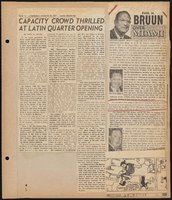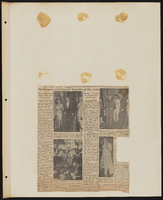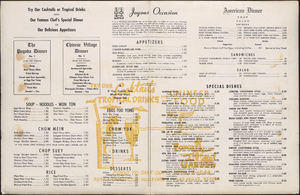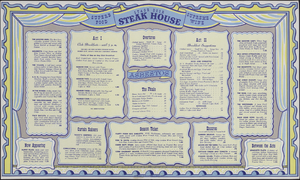Search the Special Collections and Archives Portal
Search Results
C. A. Earle Rinker Papers
Identifier
Abstract
The C. A. Earle Rinker Papers (1880-1960) contain materials that document the history of early twentieth century Goldfield, located in central Nevada, as well as the life of Rinker. Materials in the collection include correspondence, mining prospectuses, maps, ledgers, souvenirs, photographic negatives, and ephemera that document mining and daily life. Also included is biographical material that tells the story of Earle Rinker and his family before 1906 and after 1909, documenting his life in Indiana and Illinois.
Archival Collection

Maria Casas interview, June 12, 2019: transcript
Date
Archival Collection
Description
Interviewed by Maribel Estrada Calderón. Farmersville is described as a small town between, Exeter and Visalia, California populated by Mexican American farm workers. It is in this small town, where UNLV History Professor Maria Raquél Casas spent her childhood raised along with her sisters and brothers. In her interview, Dr. Casas describes how growing up in this small town with her traditional Mexican family influenced the person she is today. While working alongside her family in the fields, Dr. Casas decided that she would strive to obtain an education. Through hard work and constant support from her sister, Dr. Casas attended Fresno State, where she discovered her love for history. Upon completing her undergraduate program, Dr. Casas made the decision to further her education by pursuing a master's at Cornell University. At Cornell, she faced discouraging professors who believed she would not be able to complete the master's program let alone pursue a PhD program. Despite these demoralizing professors, Dr. Casas completed her program and was admitted into University of California Santa Barbara's history program. Dr. Casas never forgot her roots or the significance of her presence in the majority white academic spaces she attended during her academic journey. When she arrived at UNLV, she continued to strive for more Latino representation in both the student population and in the school faculty. During her tenure at UNLV, Dr. Casas has served as an advisor for multiple Latino student organizations including MEChA and SoL. Dr. Casas has witnessed much progress in Latino representation at UNLV, but she believes there is still much work left to be accomplished.
Text

Transcript of interview with Betty Bunch by Joyce Marshall, January 9, 1996, February 7, 1996, & February 13, 2002
Date
Archival Collection
Description
Betty [Rosenthal] Bunch began dancing as a child. By the time she was nine years old she decided she would have a dancing career. At 18 years she began to work in stock theatre productions. Within a short time, she had joined the Moro-Landis dancers. She landed her first job in Las Vegas in 1956 at the Sahara Hotel as part of the opening line for Donald O'Connor. Following the Sahara, she worked as a dancer at the Riveria, and then returned to the Moulin Rouge in Hollywood. In 1961 while vacationing in Las Vegas, she landed a job dancing at the Dunes. She continued to dance, sing and do comedy until after the birth of her second child. At that time, she retired from the Las Vegas showroom, but not from show business. Her involvement in both film and stage has remained rich and varied. This interview focuses on the time Betty spent performing on the Las Vegas strip, including her long involvement with the acclaimed afternoon show Bottoms Up. The interview provides information on workin
Text

Interview with Nick C. Aquilina, June 25, 2004
Date
Archival Collection
Description
Text
Las Vegas African American Community Conversations round table interviews
Identifier
Abstract
The Las Vegas African American Community Conversations is a four-part conversation with local Las Vegans. The first part of the round table is moderated by Trisha Geran with a central theme of "Migration, Work and Community Emergence." The panelists discuss the early history of the African American community in Las Vegas, Nevada. They also discuss how and why their families moved to Las Vegas, most citing the economic opportunities as a major factor. The participants share their personal histories and family histories building up the African American community in downtown Las Vegas and the Westside. The second part of the round table is moderated by Sonya Horsford with a central theme of "Education, Economy, and Integration." The panelists discuss the Clark County School District pre- and post-integration. They discuss the hardships of the Sixth Grade Center Integration Plan on the African American community as well as discussing the differences in the school facilities. The round table participants also discuss the social services and social programs and the history of those programs from the African American perspective. They also discuss civic involvement and the various civic groups started by the panelists, and share discrimination they faced.
The third part of the round table is moderated by Claytee D. White with a central theme of "Civil Rights and Entertainment." The panelists discuss the racism and segregation present in Las Vegas and discuss how African American community leaders worked to integrate African Americans into the Las Vegas community. They discuss the 1969 riots in detail, and discuss African American entertainers and the entertainment industry. They share personal experiences working in the entertainment industry and discuss the importance of the local unions, such as the Culinary Workers Union Local 226, the International Alliance of Theatrical Stage Employees Local 720, and their contributions to the unions. The fourth and final part of the round table is moderated by Rachel Anderson with a central theme of the "Early African American Legal Community." The panelists discuss the foundations of the professional legal community in Las Vegas, noting the contributions of Charles Keller, Dr. William Bailey, and the Reverend Marion Bennett as driving forces for civil rights activism in Las Vegas. They share their experiences growing up in Las Vegas facing discrimination and segregation. Lastly, they share the changes they have seen and how both the legal and African African communities have grown.
Archival Collection





